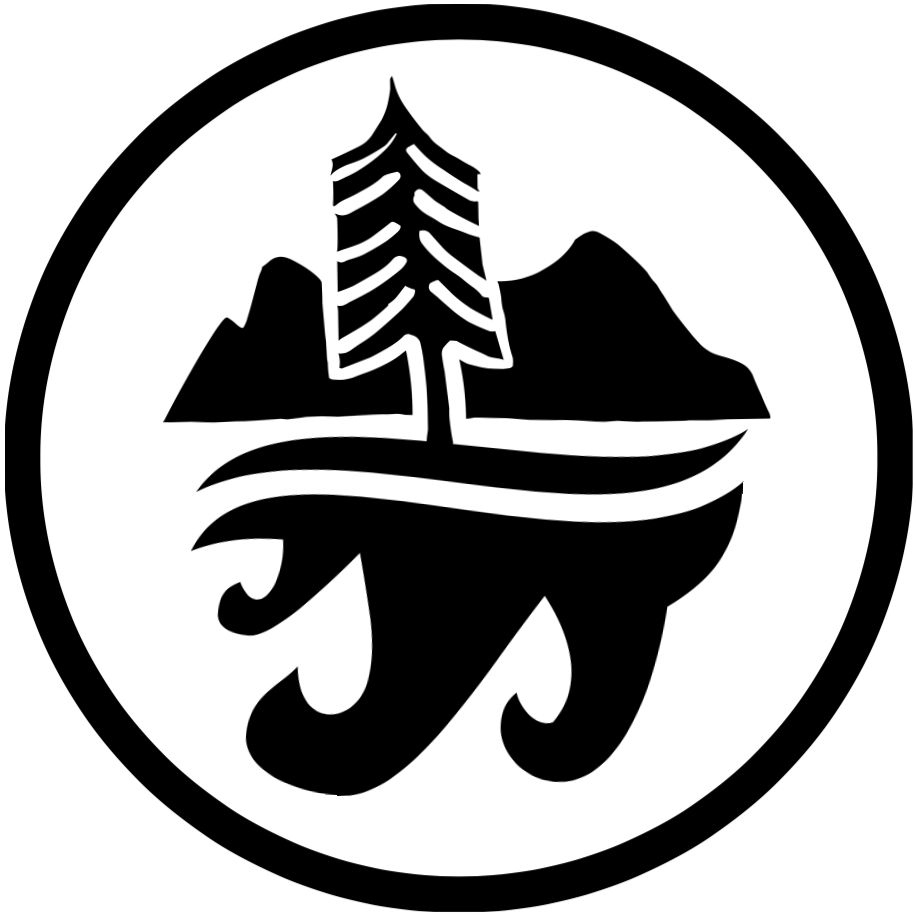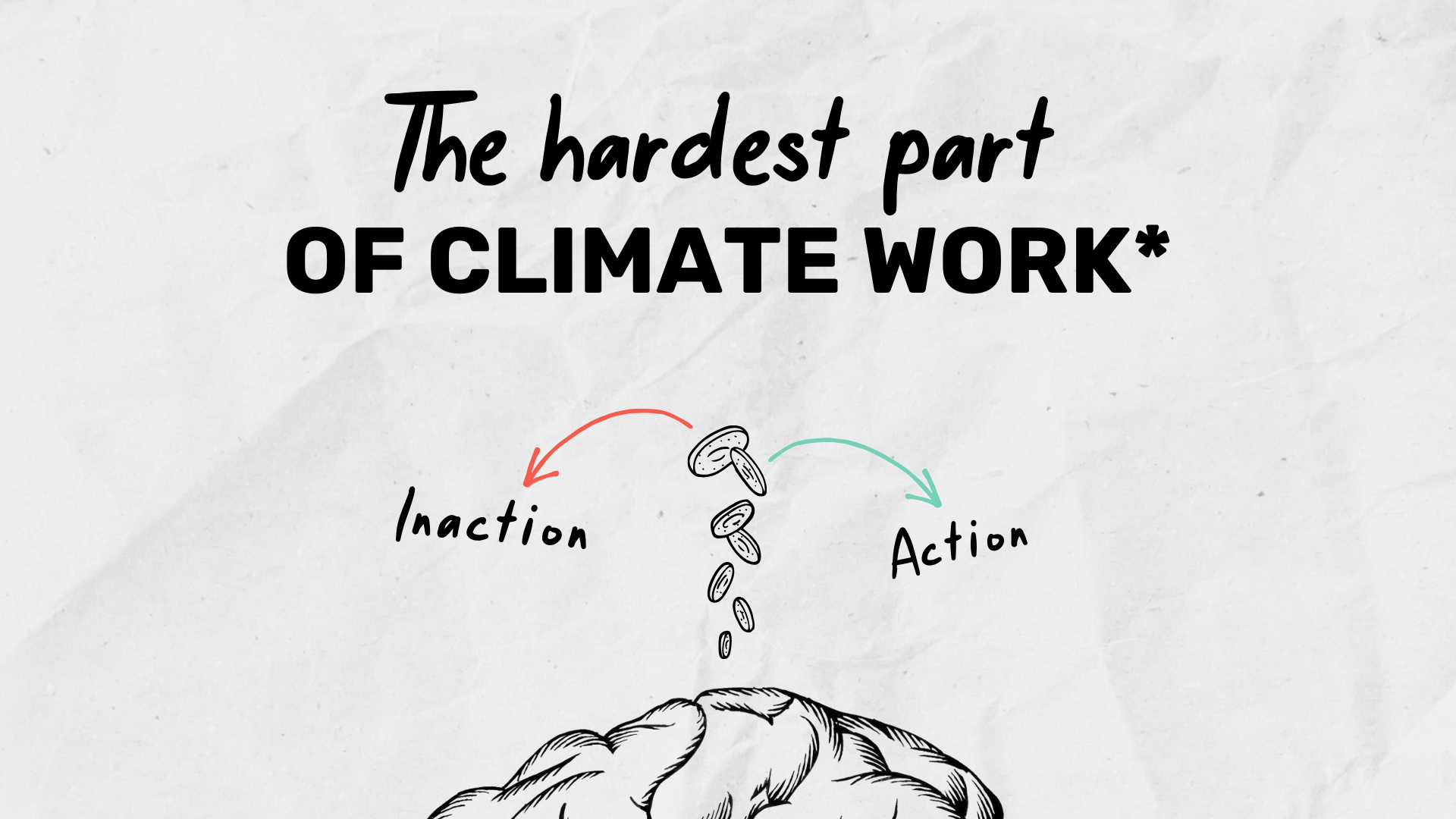Let’s talk worldviews, fear and the courage to speak up.
Some of you might recognize this sentiment: "I'm not sure if I can continue. I worked so hard for the cause, but it all seems to be for nothing nowadays". It's a vibe our field has been hit with... hard.
The more I learn about human behavior and climate outreach, the more I realize that it starts with what we bring to the space ourselves. Yet, that doesn't get nearly enough attention.
So, with this entry I'm building on the topics we explored in previous blogs, while also having the courage to look at our own biases. Let's dissect that through these 4 different lenses below.
4 Lenses of understanding
We’re at a strange point in history. Not because it’s the first time we’ve faced existential risks (been there, done that). But because it might be the first time we’ve had this much awareness, this much data, yet we still feel this stuck.
If you’re someone communicating about climate, science or sustainability, this 'paradox' will feel familiar: you know what’s coming, but you also know people don’t listen to that message.
So what do you do when that fear of environmental collapse doesn’t move people? When you feel like nothing is changing and now it’s you who is starting to fear the outcome itself?
You find a different fuel. You look inside, to understand your own motivations. Ultimately, you choose courage.
Fear is not something we should simply endure. Fear is a call. It is a signal to act.
— Ryan Holiday
Inspired by a chapter from Courage Is Calling by Ryan Holiday, this entry is for the quiet creators, the science communicators, the hesitant sharers and the ones who aren’t sure if what they say makes a difference.
Because it does. It starts with that one person who reminds others of what’s possible. A person to remind others there is a spark of hope, and not just blind optimism.
Let’s unpack that through these four lenses 👇
Understanding our audience’s worldview
Everyone sees the world through their own filter. We’re shaped by our environment and we are the sum of our lived experiences, our upbringing, the politics around us, our perceived identity and surrounding culture.
When someone resists science, or rather just shrinks away from tough conversations, it’s not always because they don’t care. It’s because the story doesn’t fit inside their worldview yet. Psychologically speaking, the topic is very distant to their sense of self and their values in everyday life.
As communicators, that’s where our work begins. Not with judgment, but with calm warm curiosity:
What stories do they believe about the world?
What stories do they believe about themselves?
What fears have they been carrying all their life?
What makes them feel safe enough to listen?
At the root, we’re doing so much more than battling misinformation. Our role is to be navigating someone’s identity. When we ignore that, our objective and scientific truths will just bounce off. Because a message only connects when the person is ready to hear it.
But, there’s more to the story. Because just like ‘them’, we have to understand where our filters come from 👇
Understanding our own worldview
It’s easy to forget that we have our own lenses too. We all carry biases. From the communities we belong to, to the content we consume every day. Just like our audience, our fears are a mix of lessons learned by ourselves and by the generations that came before us.
Taking time to reflect on our own assumptions helps us show up with more clarity and integrity:
Are you communicating to be right? Or to be helpful?
Do you want to change minds? Or change hearts?
Is rage controlling your activism? Or are you an activist using rage as a fuel?
To guide others through complexity, we first need to be able to sit with our own. We need to understand the patterns that shaped us. The triggers that drive us, for better of worse. We need to be guided by our emotions, not consumed by them. 👇
Understanding our emotions
The climate space is an emotional one. Anger. Despair. Urgency. Guilt. They run around us and inside of us. To make it a bit more practical let’s look at fear, a powerful emotion.
In a way, fear is trying to keep us save. It’s telling us our environment is changing and our status quo is being challenged. And we better 'fight or flight' that change. Sometimes however… feeling it is paralyzing.
If you work around environmental challenges, fear is everywhere. There is the fear of a world that’s collapsing. The fear of failure, in systems or just ourselves. The fear of being too late. The fear that nothing is changing and maybe never will.
And while these fears aren’t irrational, they’re also not helpful when they become our default mode of living. Anyone with (eco) anxiety will tell you how it changed their world. How their world became smaller. How they became smaller.
But, what I’ve learned is that these feelings are only one side of the coin. We have an incredible capacity to change the way we think. Our brain can change! With neuroplasticity, it has the ability to literally rewire itself, make new neural connections and remap the stream of information that's available to us.
A big missing piece here is going through the tunnel of ✨feeling our emotions✨, instead of the default for many: being consumed by them (again, been there, done that). It's learning that these emotions are here to guide us.
What if we took the courage to feel those emotions fully? And when we arrive at the other end of that—annoying—tunnel, choose a different response? 👇
Pushing hope and courage into our system
If history has taught us anything it’s that worldviews can shift, often faster than we think. And as Ryan Holiday so rightly explains, the good shifts were all caused by people who stood their ground. By people who, despite all odds and despite their emotions, showed up and showed courage.
And that's true, also in our field of climate action and environmentalism:
It took courage for scientists to first warn about climate change, back when only a few would listen. It took courage to be a whistleblower inside big oil corporations. It took courage to start building renewable energy. It took courage to challenge big oil’s lobbying and direct threats.
It takes courage to be an activist and put yourself in harms way. It takes courage to be a creator and challenge your own audience. It takes courage to be a scientist and share what you believe in, beyond the safety of our scientific bubble.
Courage is not the absence of fear, it’s moving through it.
— Ryan Holiday
I'm going to be honest, it's not easy to speak about these topics when people still roll their eyes. When it feels like algorithms are rewarding you with silence. When nuance feels like a liability.
It takes all of my courage to be writing about emotions to you, when I know some might think: BUT WE HAVE THE TECH AND THE KNOWLEDGE. STOP BEING SO DAMN FLUFFY. GET OVER YOURSELF.
But courage is contagious.
Every voice that speaks with conviction and confidence, however imperfectly, adds pressure to the system. Every person adds weight to the scale. It’s what creates tipping points. It’s what helps us flip the coin out of fear, into hope.
Now it’s your turn
When I started Creators For Climate, I didn’t know where it would go. I just knew staying silent wasn’t an option for me anymore. I couldn’t just make another ‘review’ video or finish another corporate freelance gig.
Long talks with experts, colleagues, friends, (biblio)therapy and journalling helped me realize that emotional work is at the core of our field. It made me a better person for it too, and I’ve never had more resolve.
I wish that all for you too. That you can find peace with yourself. That you realize you are enough. That you know the world needs your voice so freakn’ much right now. Let’s flip that damn coin already.
Here 4 reflection prompts:
What worldview does my audience hold and how might it be blocking my message?
Where am I speaking from? Certainty, compassion, ego or fear?
What emotions are driving me and my content lately? Are they helping or hurting me?
What would courage look like in my next post or project?
Disclaimer
If you need help with this, know there are many capable people out there to guide you. There’s no shame in reaching out for professional therapy, for reading books or talking about this with your friends. Find you safe space if you haven’t already.
What’s next:
Community driven knowledge
We’re testing the Science Communication 101 workbook with a handful of driven scientists at the moment. Please join the waitlist if you want to be notified when we launch.
Latest blog posts












